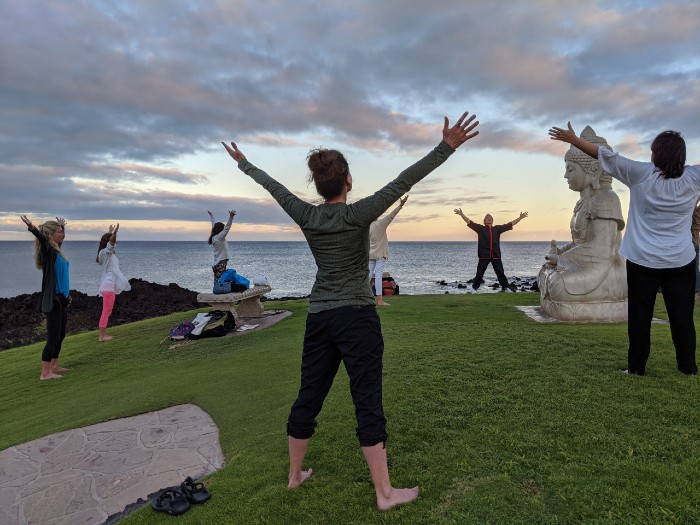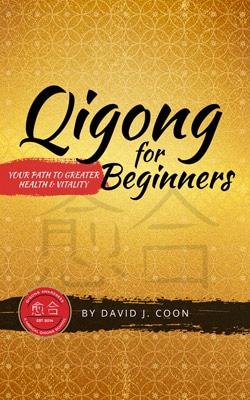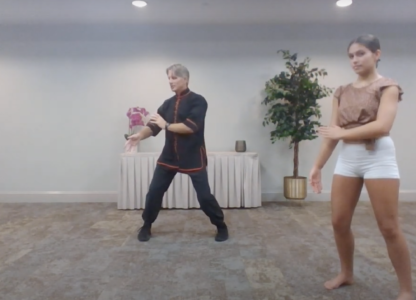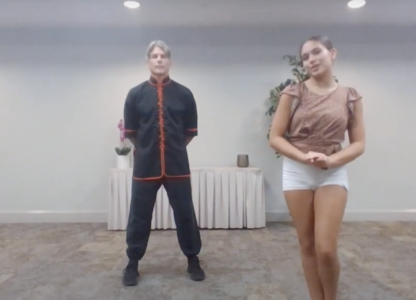21 Day Qigong Challenge
This 21 Day Qigong Challenge is for all levels from beginner to advance students. This program will help to make positive changes in your life by creating a new habit. There is a process required to change one’s bad habits and replace them with new positive ones. Many studies have been done over the last ten-plus years demonstrating in many cases that there is a magic number of days required for breaking old habits and adopting new ones and that magic number is twenty-one. Since it can take 21 days or more to adopt a new habit we recommend taking this program at least once. You may take it as many times as you would like. There is no additional fee.
Whether you are looking to lose weight, increase energy, change your diet, take up a new form of exercise, or all of the above, it may take you more than 20 consecutive days and less than 22 consecutive days to forge those new habits. Those who are looking for a new form of exercise, one that is non-impact and yet yields great results including increased energy, decreased pain, balanced emotions, increased bone density, balances in blood pressure and hormone cycles as well helping with weight loss then you might consider the practice of Qigong.
Qigong is pronounced (Chee-Gong) and it is an ancient form of exercise that originated in China. Some forms of Qigong are actually forms of martial art as well and this can often be confusing to the beginner. Just like there are many styles of martial arts including Kung Fu, Tai Chi Chuan, Karate, Judo, Ju-Jitsu, Tae Kown Do, and more, there are many different styles of Qigong as well. Tai Chi for example is a very popular form of Qigong and it is also a martial art in that it has martial art applications.
When seeking a Qigong practice with little to no interest in the martial arts one might consider Medical Qigong. Medical Qigong emphasizes healing the body of toxic emotions and negative thinking as well as protecting and clearing the body of foreign pathogens such as harmful bacteria and viruses. Although there are reportedly 300 different styles of martial arts and over three thousand different styles of Qigong which again can be daunting for a beginner here are a few tips:
Tips For Finding The Right Fit – Qigong or Tai Chi Chuan Class
Tip Number One: Tai Chi is the most popular form of Qigong and it typically involves very slow-moving martial art forms with an emphasis on developing Chi meaning energy or vital force. Most Tai Chi classes and schools do not emphasize the martial art side of the training. Some do. Be sure to inquire as to what type of Tai Chi Chuan is being taught to find your best fit.
Tip Number Two: Qigong typically does not involve martial arts practices either but in some schools it does. One of the styles of Qigong that is gaining popularity and is becoming a close second to Tai Chi is a form of Qigong called Medical Qigong. Medical Qigong does not typically include practices of martial art although there are exercises that may appear martial art in nature that involve making sounds and are typically used to detoxify the liver and calm the shen or heart fire. It is recommended to both speak to the teacher and observe the class to see if it is a fit for you.
Tip Number Three: Many Tai Chi Chuan and Kung Fu schools use Qigong for a warm-up for their martial arts training. Again simply look into what the instructor/ s are teaching and see if it looks safe and fun for you. Be sure to share any health conditions with the teacher which will also help identify if the class is a good fit for you or not.
Tip Number Four: It is possible to find Qigong and Tai Chi schools that do not emphasize martial art although some of the movements may appear to mimic, Martial Tai Chi, Kung Fu or Karate. Typically classes that are defined as Qigong or Tai Chi or Medical Qigong are a safe bet for those who just desire to focus on developing their inner strength and the vitality of mind body and spirit. Typically if Tai Chi is practiced for martial arts you will see a denotation such as Chen Style Tai Chi and if you look further you will most likely see that the instructor offers classes where they cover the martial art applications. So if you are not into that simply keep looking.
Tip Number Four: Don’t be afraid to ask any of the teachers about what they teach and how it might benefit you. In asking questions you will learn a lot about the arts and have the opportunity to see what the teacher emphasizes in his or her classes.
In our Qigong Awareness LLC school and amongst all of our current Certified Qigong Instructors we emphasize Medical Qigong practices which again include some martial art like movements and sounds but these movements have nothing to do with self-defense and they are performed in very slow motion, anyone at any age can do them. The small percentage of techniques with martial art flavor emphasizes breathing and chi development. They are performed with no force and in very slow motion. These exercises are used again to clear and detoxify certain organs especially the liver and they are incorporated into the other movements and Qigong exercises.
Tip Number Five: Unlike Tai Chi and even Kung Fu which emphasizes different fighting forms moving around in different directions in space, Medical Qigong practices can typically be done right from a small space like that of a yoga mat. (No yoga mats required.) Also, Medical Qigong classes may be taught very specifically to alleviate anxiety and depression for example or they may be taught in a cross-training sort of way where the instructor blends together different techniques to create an overall experience of energy, passion, wakefulness, self-empowerment, and/or blissful states of relaxation.
Start Slow – Even 10 minutes a day is very beneficial
Like any form of exercise, it is wise to start slow and easy with Qigong practice. Even though it is slow and non-impact it has amazing benefits and it will challenge your balance, your strength, your coordination, your blood pressure, your weight, etc. It takes time to get used to. A general class is one hour long but many people who are not well cannot even do half of that class. I recommend beginning with just ten minutes a day and I recommend doing that for 21 days. This has many benefits! When you practice in this fashion you start off with much more realistic goals and therefore you are more likely to practice long enough to see the kinds of encouraging results you are looking for!
Too much too soon almost always backfires. So I recommend a mindful approach one that focuses on small goals and consistency (as best you can) over twenty-one days. This gives you more than just a shot for success it sets you up for it!
If you have questions feel free to reach out to us directly at Qigong Awareness LLC or reach out to one of our Certified Instructors from around the country and we will do our best to point you in the right direction!
Is it possible to do Qigong while having debilitating health issues? Yes absolutely! This is why Qigong and in particular Medical Qigong differs greatly from Martial Arts and Martial Qigong and even Kung Fu. The emphasis is on healing and working with subtle energy, breath, and movement in order to bring healing to the mind, body, and spirit. Some Qigong classes are significantly easier and designed more for people who are struggling with health issues and others are a bit more challenging. Again speak to the instructor and ask them if the class they are teaching is going to meet your needs or not. Many instructors will also offer Private Qigong Instruction which can also be an option for many people who need special attention.
Please Note: Private Qigong Instruction does differ from Medical Qigong treatment. Private Qigong Instruction with a Certified Instructor emphasizes Qigong exercises and Qigong practice where as a Medical Qigong Treatment is more along the lines of Acupuncture without needles likened to a Reiki session. One of the differences between Reiki and Medical Qigong is that Medical Qigong has a much more in-depth history, study, and research dating back two thousand plus years. Medical Qigong gave rise to modern-day Acupuncture.
Student Shares About Taking The 21 Day Qigong Challenge:


Instructor’s Bio:
David J. Coon, Medical QiGong Master
When David was fifteen years old he was diagnosed with a severe spinal disease and told that he would be crippled by the time he was thirty years old. Unwilling to accept this fate, David began intensively studying Oriental Medicine, Medical Qigong, Martial Arts, and Meditation.
David learned how to cultivate and direct the energetic life force called Chi in Traditional Chinese Medicine. Through Qigong practice, David healed his spinal disease completely! David also found that his mood, his attitude, his outlook on life, and his intuition had all increased exponentially. He was drawn to teaching and sharing these healing practices and spiritual counsel with others.
David is now a Medical Qigong Master with over thirty years of experience facilitating healing for people using Medical Qigong. He has taught and lectured around the country to both laypeople and professionals about the healing power of Qigong. David’s Qigong practices are now being practiced around the world. They are simple, effective, and can be practiced by anyone at any age.
David also has a vast Martial Arts background with Black Belts in Karate, Tae Kwon Do, and Kenpo Karate. He has been an Instructor of Jeet Kune Do and Filipino Martial Arts. He has also studied Japanese Ju Jitsu, Kung Fu, Small Circle Ju Jitsu, Aikido, Chen Style Tai Chi, Brazilian Jiu-Jitsu, Pen Jak Silat, Kendo, and more. Over 35 Years of Experience.
David’s Qigong Practices are underpinned by his Psychology degree from the University of Connecticut and three years of experience as a Professional Counselor in Louisville, Colorado. He also spent three years at the University of Colorado studying Molecular and Cellular Biology to better understand the inner workings of the body on a cellular and biochemical level.
David began in 2007 offering continuing education workshops to Acupuncturists through the NCCAOM, the governing body for Acupuncture in the United States.
David is the author of Qigong For Beginners: Your Path to Greater Health & Vitality available on Amazon. David has also been featured on KGNU radio programs, in newspapers around the country, and has published articles in Magazines including “Medical Qigong and Acupuncture, A Cutting Edge Combination,” featured in Acupuncture Today.
Alongside his busy traveling, writing, and filming schedule David offers private Medical Qigong Healing Sessions, Personal Coaching, and Distance Healing around the country and beyond.







